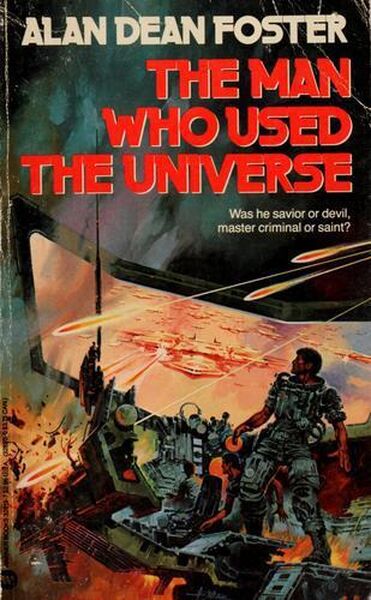Ambition
The Man Who Used The Universe
By Alan Dean Foster

2 Jan, 2025
Alan Dean Foster’s 1983 The Man Who Used the Universe is a stand-alone science fiction novel.
Kees vaan Loo-Macklin, impoverished resident of industrial planet Evenwraith, joins a criminal gang because that seems to the coldly logical young man his best chance to survive long enough to pursue better goals. His boss. Lal, is suspicious of the new recruit, who doesn’t seem to have any personal vices. Anything Lal can’t understand could be a threat. Lal knows how to handle threats.
Lal orders Loo-Macklin to carry out a contract killing. The target has been previously attacked and has defeated all attackers. Loo-Macklin may be being sent to his death. But if he survives… Lal has arranged for a very special reward.
Loo-Macklin has little trouble dispatching his target. Lal rewards success with an assassination attempt on Loo-Macklin. Lal begins to suspect that perhaps he has miscalculated shortly before Loo-Macklin violently murders assassins, Lal, and a number of bystanders.
Loo-Macklin’s next move is conventional: take Lal’s place and secure power over the gang. Like any entrepreneur, Loo-Macklin is keen to expand. In short order, his gang is the dominant gang on the planet. Indeed, a number of the rival gangs are covertly run by Loo-Macklin.
Organized crime is tolerated by the United Technologic Worlds as long as it knows its place. Gangs are supposed to remain limited to single worlds. When Loo-Macklin begins to expand operations to other planets, he attracts the attention of some very powerful people. Clearly, something must be done about Loo-Macklin.
Not being idiots, the very powerful people don’t bother trying to arrest or kill Loo-Macklin. He is clearly a man who is very hard to arrest or kill. Instead, they offer Loo-Macklin a choice: accept a huge bribe to retire, or have his rivals subsidized for as long as it takes to bring Loo-Macklin’s gang down. Loo-Macklin accepts the bribe.
Retired gangsters are supposed to embrace reclusive hedonism. Loo-Macklin reinvents himself as a successful businessman. His entirely legitimate concerns span the UTW. They even reach into nearby alien regions, even the worlds of the repulsively octopoid Nuel.
What is Loo-Macklin’s true goal? What would he pay to achieve it? Is the UTW and humanity itself doomed thanks to one relentless ex-gangster?
~oOo~
That’s one grumpy looking Luke Skywalker on the SFBC edition cover.

By the time this book appeared, Foster had published twenty-two (or so) novels and edited eleven (or so) anthologies. Pretty impressive, given that he had debuted in 1971. That is one book about four months, sustained over more than a decade.
This history might explain why The Man Who Used the Universe is such a terrible book. The premise itself, a man of mystery whose motivation and true goals are unknown, isn’t inherently terrible. What went wrong? Perhaps focusing on prolific output means no time to rethink a project when it does go wrong.
There are for me two issues that stand out over all of the others.
First, Loo-Macklin may be a man of mystery and his co-workers an assortment of conniving criminals, scheming businessmen, and secretive, tentacle-waving aliens with designs on humanity… but most of them love to talk. Whether carefully explaining to targets that they will soon (once the PowerPoint presentation is over) be assassinated, or explaining to fellow conspirators the details of a political scheme with which they should already be familiar, few of the paper-thin characters seem familiar with the phrase “actions speak louder than words.”
Second, Loo-Macklin spends the novel playing in god-mode. His plans always work. His enemies’ plans fail to surprise. In part, this is because Loo-Macklin is adept at manipulating other people into doing whatever he needs them to do. The single exception is when a rejected lover kills herself, and even there it was not clear if this was an outcome he didn’t predict or one he foresaw but regretted.
The mystery isn’t if he will succeed, as the novel makes it clear he always wins. The mystery is why he wants to succeed. Unfortunately, the novel does not leave this as an enigma. Like the reasons for mob-hits and political plots, Loo-Macklin’s motivation eventually receives its allotted exposition. Too bad the motivation is tremendously banal.
Few novels are completely without merit. I appreciated one plot point: the very powerful men have the wisdom to just throw money at Loo-Macklin to get him to retire, rather than opting for some more clearly doomed plan.
Ah, well. I know there were some Foster novels that I liked. I will have to fit one of those into the schedule.
The Man Who Used the Universe is available here (Amazon US), here (Amazon Canada), here (Amazon UK), here (Apple Books), here (Barnes & Noble), here (Chapters-Indigo), and here (Words Worth Books).
